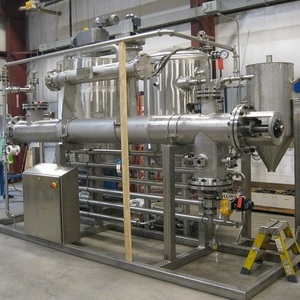Ace Ethanol to install D3MAX cellulosic ethanol pilot plant

Photo: BBI International
February 16, 2017
BY BBI International
D3MAX has announced the completion and shipment of its pilot plant employing the patented D3MAX cellulosic ethanol technology. The pilot facility will be installed at Ace Ethanol LLC in Stanley, Wisconsin, in late February. Installation is expected to be complete by mid-March with startup and testing at the facility taking place over the ensuing two months.
“We are very excited to take this next step in developing the D3MAX technology,” said Mark Yancey, chief technology officer for D3MAX. “Ace has been an excellent partner in the lead up to the installation and running of the pilot facility.”
“We see this type of bolt-on technology as a clear path forward for cellulosic ethanol,” said Neal Kemmet, president and general manager at Ace Ethanol. “Of course, much will be determined during the next phase of pilot testing. However, if successful, we feel the D3MAX process will be key in allowing current producers to lead the way for the next generation of ethanol production.”
Operation of the skid-mounted unit, constructed by Ohio-based AdvanceBio Systems, will help narrow the operating parameter such as pretreatment time, temperature, pH, etc. Upon successful completion of pilot testing and data collection, D3MAX intends to complete the full detailed commercial design and license the technology across the U.S. and Canada.
To learn more about D3MAX visit www.D3MAXLLC.com.
About D3MAX LLC
D3MAX is a technology company formed by BBI International to license its patented cellulosic ethanol technology to dry mill ethanol plants in the U.S. and Canada. The cutting-edge technology converts corn fiber and residual starch in distillers grains to cellulosic ethanol. This is a 1.5 billion gallon per year market and the company intends to capture a significant portion of the market by licensing its D3MAX technology to existing ethanol plants.
Advertisement
Advertisement
Advertisement
Advertisement
Related Stories
CoBank’s latest quarterly research report, released July 10, highlights current uncertainty around the implementation of three biofuel policies, RFS RVOs, small refinery exemptions (SREs) and the 45Z clean fuels production tax credit.
The U.S. Energy Information Administration maintained its forecast for 2025 and 2026 biodiesel, renewable diesel and sustainable aviation fuel (SAF) production in its latest Short-Term Energy Outlook, released July 8.
XCF Global Inc. on July 10 shared its strategic plan to invest close to $1 billion in developing a network of SAF production facilities, expanding its U.S. footprint, and advancing its international growth strategy.
U.S. fuel ethanol capacity fell slightly in April, while biodiesel and renewable diesel capacity held steady, according to data released by the U.S. EIA on June 30. Feedstock consumption was down when compared to the previous month.
XCF Global Inc. on July 8 provided a production update on its flagship New Rise Reno facility, underscoring that the plant has successfully produced SAF, renewable diesel, and renewable naphtha during its initial ramp-up.
Upcoming Events










